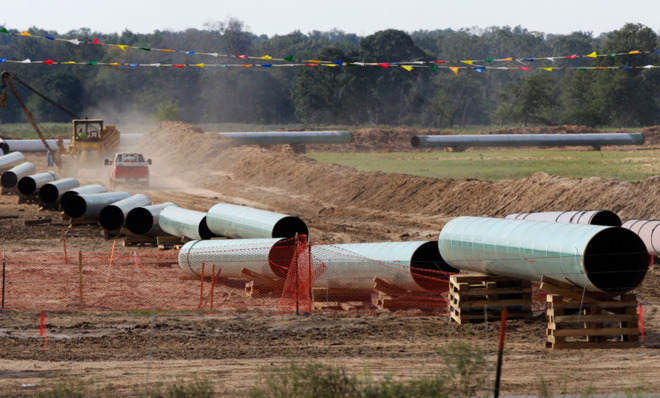Here's yet another reason to stop the Keystone XL pipeline
U.S. companies are responsible for some of the worst infrastructure in the developed world. And we're trusting them to build a spill-free pipeline from Canada to Texas?


A free daily email with the biggest news stories of the day – and the best features from TheWeek.com
You are now subscribed
Your newsletter sign-up was successful
Throughout the debate over the Keystone XL pipeline, I have adduced several arguments to oppose its construction, mostly centered around the absolute necessity of having some kind of mass movement to agitate for action on climate change. The pipeline offers just such an opportunity.
One aspect of the pipeline debate that I have given short shrift, however, is the fact that it will have to be built, at least in part, by American construction companies, which are among the worst in the developed world. TransCanada, the corporation in charge, is a Canadian company, but it will be operating in a U.S. context, which undoubtedly means it will use multiple American subcontractors. This is yet another reason to not approve this pipeline.
I've written before about how our shoddy political institutions have stuck this nation with low-quality infrastructure that is dramatically more expensive than almost anywhere else on Earth. But there is reason to be especially wary of low-quality pipelines: spills. The journalism start-up InsideClimate News won a Pulitzer Prize for its coverage of the "Dilbit Disaster" in Michigan, a terrible spill of diluted bitumen from a broken pipe.
The Week
Escape your echo chamber. Get the facts behind the news, plus analysis from multiple perspectives.

Sign up for The Week's Free Newsletters
From our morning news briefing to a weekly Good News Newsletter, get the best of The Week delivered directly to your inbox.
From our morning news briefing to a weekly Good News Newsletter, get the best of The Week delivered directly to your inbox.
Under current proposals, Keystone would carry that same diluted bitumen, a particularly vile form of crude oil that is devilishly hard to clean up, largely because it tends to sink in water. Keystone will carry over 800,000 barrels of the stuff per day.
And what did we learn yesterday? Turns out the State Department has placed new safety regulations on the proposed pipeline, because the just-finished southern leg of Keystone running from Oklahoma to Texas was plagued with construction mistakes:
"From the start of welding, TransCanada experienced a high weld rejection rate," said one letter dated Sept. 26. Over 72 percent of welds required repairs during one week. In another week, TransCanada stopped welding work after 205 of 425 welds required repair. Inspections by the safety agency found TransCanada wasn't using approved welding procedures to connect pipes, the letter said…
The weld failure rates are "horrible," said Robert Bea, professor emeritus of civil and environmental engineering at the University of California, Berkeley. "The level of defects is indeed cause for alarm and indicative of something that is going on in the Keystone organization that isn't satisfactory." [Associated Press]
What's more, we also know that the pipeline won't be using the most advanced leak detection techniques, even though it would probably be quite cheap.
A free daily email with the biggest news stories of the day – and the best features from TheWeek.com
New regulations are good news — better than not having them at all. But I have vanishingly little confidence that they will cover all the potential construction screw-ups that today's bloated multinational corporations are capable of, or that the new regulations will be adequately enforced. Today's corporate law is dominated by egregious legal violations, each one more staggering than the last, followed by slap-on-the-wrist fines.
We've got corporate greed versus corporate incompetence in a contest here — and I'm not willing to bet the Ogallala Aquifer on greed winning out.
Ryan Cooper is a national correspondent at TheWeek.com. His work has appeared in the Washington Monthly, The New Republic, and the Washington Post.
-
 The plan to wall off the ‘Doomsday’ glacier
The plan to wall off the ‘Doomsday’ glacierUnder the Radar Massive barrier could ‘slow the rate of ice loss’ from Thwaites Glacier, whose total collapse would have devastating consequences
-
 Trump’s fuel blockade puts Cuba in crisis mode
Trump’s fuel blockade puts Cuba in crisis modeIN THE SPOTLIGHT Plummeting tourism, scrambling airlines and rolling blackouts are pushing Cuban society to the brink
-
 ‘The mark’s significance is psychological, if that’
‘The mark’s significance is psychological, if that’Instant Opinion Opinion, comment and editorials of the day
